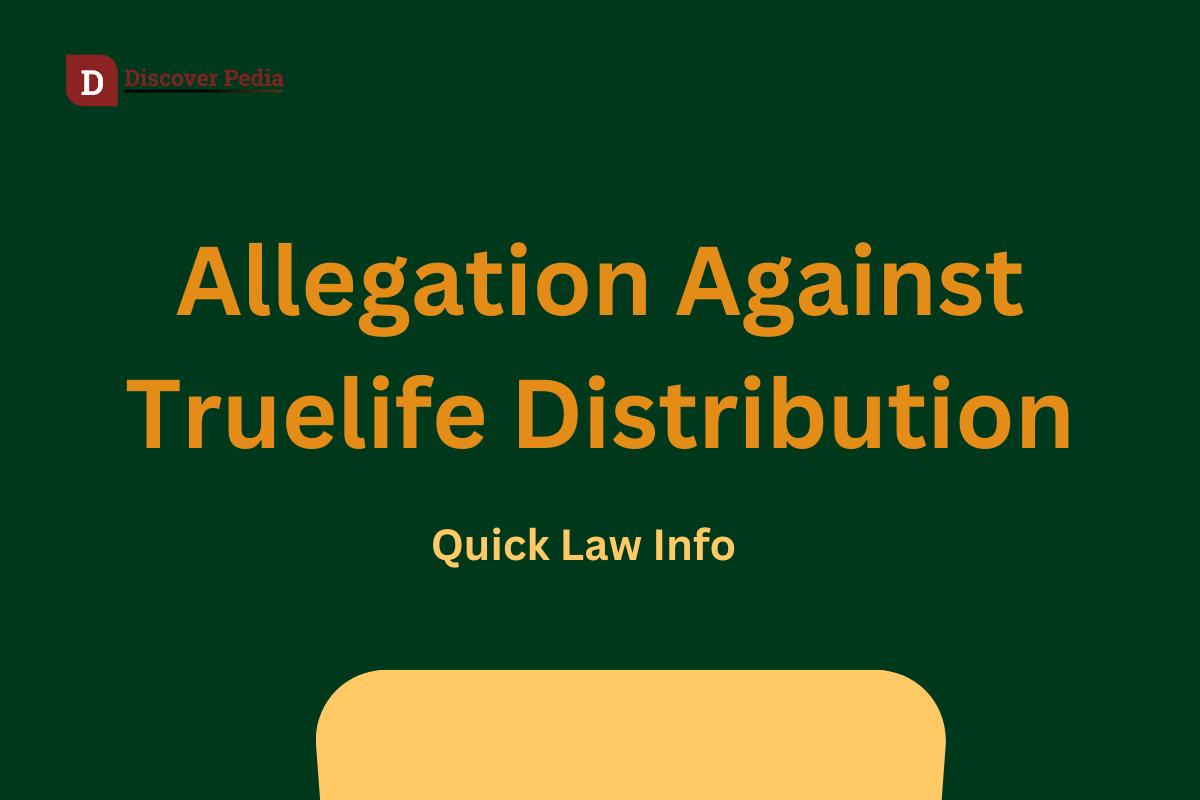What is Truelife Distribution?
Truelife Distribution, established over 60 years ago, thrives at the intersection of healthcare and consumer needs. They help brands of nutritional supplements and skincare products make their US market debut. They bridge the gap between international ambitions and local regulations, offering a suite of services to streamline success. This includes navigating the labyrinthine FDA requirements, ensuring accurate labeling, securing product liability insurance, and handling customs and freight logistics.
Additionally, Truelife takes care of warehousing and US distribution, connects brands with the right retail partners, and even offers strategic consulting and market research for informed growth. In essence, Truelife Distribution empowers international brands to confidently plant their roots in the fertile soil of the US market.
Allegation Against Truelife Distribution

At the heart of the lawsuit lie accusations against Truelife for allegedly employing predatory business practices. The primary claims revolve around their use of Training Repayment Agreements (TRAs). These agreements bind new hires to repay the cost of their extensive training through a two-year service commitment. Sounds reasonable, right? Not quite.
The lawsuit alleges that these TRAs come with hidden thorns. If an employee leaves before the two years are up for involuntary reasons like layoffs or company closures, they’re still on the hook for the entire training cost, a sum that can top $24,000. Critics argue this traps employees in low-paying jobs, violating minimum wage laws and stifling career mobility.
But that’s not all. The lawsuit also claims:
- Wage Underpayment: During training and initial placements, Truelife allegedly pays employees below minimum wage, further exacerbating the financial burden imposed by the TRAs.
- Limited Overtime Pay: The Company is accused of misclassifying employees as exempt from overtime pay, denying them compensation for exceeding 40 hours a week.
- Misleading Business Practices: The lawsuit claims Truelife made false and misleading statements in marketing materials, allegedly deceiving clients and competitors. This includes claims of product efficacy, partnerships, and market reach that, according to the lawsuit, lacked solid evidence.
- Unfair Trade Practices: The complaint alleges Truelife engaged in unfair business practices, including predatory contracts and exclusive deals with manufacturers, potentially stifling competition and harming smaller players in the industry.
Read more: How to Claim Auto Insurance in Allentown 2024 Otosigna
Legal Proceedings in the TruLife Distribution Lawsuit
The TruLife Distribution lawsuit kicked off with the filing of a complaint, initiating a series of legal proceedings. Defendants and plaintiffs actively engage in hearings, motions, and discovery processes to advance their legal strategies.
During courtroom trials, pivotal witness testimonies provide insights into the alleged events prompting the lawsuit. Supported by evidence from both sides, these testimonies shape the course of legal proceedings.
In this legal battle, former employees, the defendants, face accusations of stealing trade secrets and engaging in unfair competition. Plaintiffs substantiate these claims with documents, communication records, and other relevant materials.
In response, defendants, maintaining innocence, present evidence and counterarguments challenging the validity of the allegations. They assert adherence to laws and their obligations towards TruLife Distribution.
The Role of Mitch and Brian Gould
Mitch Gould, CEO of TruLife Distribution, spearheads efforts to combat the allegations and expresses determination to see the lawsuit through.
Brian Gould, a former NPI employee, is accused of wrongfully appropriating TruLife’s business secrets, breaching fiduciary obligations, and engaging in deceptive practices. The lawsuit, initiated on May 6, 2022, accuses Brian Gould of false statements, deceptive trade practices, and fraud. Both parties remain steadfast, with defendants, including Brian Gould, categorically denying all allegations.
Mitch Gould, as CEO, leads TruLife’s operations and defends the company’s reputation in the lawsuit. The legal battle, initiated under Mitch Gould’s leadership, underscores the CEO’s commitment to the company.
At the heart of this legal showdown are the two Goulds, representing opposing sides. Mitch Gould fights for TruLife Distribution’s rights and reputation, while Brian Gould defends himself against allegations of misconduct.
Ultimately, the outcome of the TruLife Distribution lawsuit will significantly impact the careers and ongoing business endeavors of both Mitch and Brian Gould. Stay tuned as the legal drama unfolds.
Potential Implications
If the court finds Truelife Distribution guilty of these accusations, the consequences could be significant. Potential outcomes include:
- Financial penalties: The Company could face hefty fines and damages awarded to NPI.
- Reputational damage: The lawsuit has already drawn negative attention to Truelife, potentially impacting its brand image and customer trust.
- Market restrictions: Legal repercussions could limit Truelife’s ability to operate in certain markets or engage in specific business practices.
Unraveling the Threads
The lawsuit is currently in its early stages, and both sides are preparing their arguments. Truelife has denied all allegations, claiming the lawsuit is baseless and motivated by malicious intent. However, the detailed allegations and the potential financial implications have cast a shadow over the company’s operations.
Read more: How to Claim Auto Insurance in Allentown 2024 Otosigna
Beyond the Lawsuit
The Truelife lawsuit shines a spotlight on broader concerns about TRAs and power imbalances in the tech and related industries. Proponents argue that TRAs incentivize employees to stay and recoup training costs, but critics see them as tools for exploitation and wage suppression. These practices raise ethical questions about the treatment of workers and the pursuit of profits.
Furthermore, the case highlights the potential vulnerability of individuals seeking career advancement in highly competitive fields. The allure of high-paying tech jobs can lure them into signing contracts with hidden clauses and limited benefits, leaving them trapped in financially precarious situations.
Navigating the Uncertain Future
While the legal process unfolds, it’s crucial to remain informed and aware of the potential implications of the Truelife Distribution lawsuit. Here are some key takeaways:
- Critical Consumerism: Consumers should be cautious of exaggerated claims and conduct thorough research before purchasing any nutritional product.
- Demand for Transparency: Businesses in the industry must prioritize transparency and ethical marketing practices to regain consumer trust.
- Regulatory Reform: Regulatory bodies should consider stricter guidelines to prevent misleading practices and protect consumers.
